- Government has agreed with IMF that Rs55 billion would be passed on to consumers.
- Remaining Rs10 billion would be absorbed through subsidy.
- Pakistan’s cash-bleeding power sector is moving rapidly towards bankruptcy.
ISLAMABAD: The International Monetary Fund (IMF) has asked Pakistan to pass on Rs65 billion to consumers of electricity which has been deferred in the shape of Fuel Price Adjustments (FPA) during the peak of last summer season.
Out of the total outstanding amount of Rs65 billion on account of deferment of FPA in the electricity bills in the current fiscal year, the government has agreed with the IMF that Rs55 billion would be passed on to consumers and that would be recovered through bills. The remaining Rs10 billion would be absorbed through the allocation of subsidy amount.
In a grim situation, Pakistan’s cash-bleeding power sector is moving rapidly towards bankruptcy, as its total accumulated losses might climb up to Rs1,734 billion for the current fiscal year with the adoption of a status quo approach.
On the other hand, the consumers consider themselves voiceless because the word reform means hiking of tariffs, but actually it results in jumping theft in this sector.
Out of the total accumulated losses of Rs1,700 to Rs1,800 billion, there is a possibility of a subsidy of Rs1,000 billion and around Rs700 to 800 billion piling up in the monster of circular debt if no remedial measures are taken by the government.
Now, the multilateral creditors, including IMF/World Bank, are asking the government to come up with plans to finance the un-budgeted subsidies, including the K-Electric subsidy for which the Ministry of Finance allocated Rs26 billion against revised projections of Rs162 billion, surfacing a gap of Rs136 billion where no amount was available to bridge this gap.
The same scenario prevailed for the Zero Rating Industry (ZRI) and Kissan Package for which the government did not make subsidy allocations of Rs118 billion and Rs28 billion respectively in the current fiscal year.
The IMF also raised concerns over the failure to receive a deferred payment of bills on account of Fuel Price Adjustment, which is estimated to cost Rs65 billion. The bill recovery was reduced from the original target of 93.58% to 92%, creating a gap of Rs55 billion in the current fiscal year.
The theft of electricity target is also missed as the Transmission and Distribution (T&D) losses target was revised upward from 15.83% to 16.27%, which would result in a deficit of Rs31 billion.
The generation cost recovery is going to cause a financial loss of Rs63 billion. Rs24 billion for May-23 and Jun-23 FCA and Rs39 billion for Q3 & Q4 FY-23 Quarterly Tariff Adjustment (QTA) would be recovered in FY-24.
The hike in markup in recent months also jumped up liabilities of the power sector as the markup on IPPs and Power Holding Company increased from Rs185 billion to Rs249 billion, registering an increase of Rs64 billion.
The K-Electric resolution of subsidy will cause an additional burden of Rs136 billion for which the Finance Division did not make any budgetary allocation in the budget.
In the wake of less demand for power from 45 billion units to 40 billion units in the first quarter of the current fiscal year, the revenues dropped from Rs493 billion to Rs347 billion, registering a loss of Rs55 billion. The non-recovered GST paid to FBR is projected to cause a loss of Rs91 billion in the current fiscal year.
Now, it is expected there will be a possibility of generating financial losses in the range of Rs700 to Rs800 billion accumulating into the form of circular debt in the current fiscal year if the government did not hike the tariffs, bring efficiency and improve governance in cash-bleeding power sector.

 Business3 days ago
Business3 days ago
 Business3 days ago
Business3 days ago
 Business3 days ago
Business3 days ago
 Latest News3 days ago
Latest News3 days ago
 Latest News3 days ago
Latest News3 days ago
 Business3 days ago
Business3 days ago
 Business3 days ago
Business3 days ago
 Latest News3 days ago
Latest News3 days ago



















